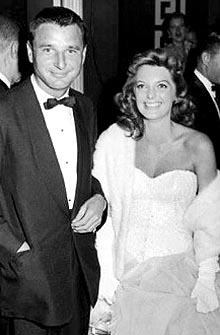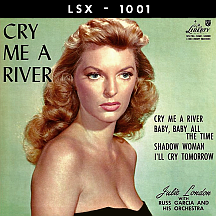JULIE LONDON
Cry Me a River
"The girl with the 'come hither' voice" was the nickname L.A. disc jockey Bill Ballance bestowed upon Julie London in his opening to the liner notes of her first album, Julie is Her Name. The album's sexy cover photo was an eye-catcher, for men at least; her close-to-the-microphone vocal delivery set against a lean musical backing (guitarist Barney Kessel and bassist Ray Leatherwood) conveyed an intimacy that set her apart from other female pop stars of the day. The album was successful for more than just the image on the cover, thanks in large part to the timeless hit song "Cry Me a River."
Her given name was Gayle Peck, her family lived in Santa Rosa, California before moving to Los Angeles, and in 1944, at just 17 years of age, she caught the eye of an agent, Sue Carol, who gave her the Julie London name and succeeded in getting her cast in a starring role opposite Buster Crabbe (the former Tarzan and Flash Gordon star) in Nabonga...a jungle flick about a sort-of love triangle between a guy, a girl and a gorilla! Several credited and uncredited B film roles followed over the next several years. In 1947 she married Jack Webb, four years before his breakthrough with the TV series Dragnet. The jazz-obsessed couple frequented L.A. nightclubs, a social routine Julie continued for many years; they were often spotted, and photographed, out and about.
For three years in the early 1950s she put her less-than-spectacular acting career on hold but resumed in 1954 after divorcing Webb. A dramatic turn on an episode of Armstrong Circle Theater led to roles in crime and western films and more anthology-themed TV series. She met Bobby Troup, a bandleader and songwriter (his most famous composition, "(Get Your Kicks On) Route 66," had been a hit in 1946 for The King Cole Trio and was one of Nat "King" Cole's signature songs). They became romantically involved and Troup felt she had the talent to make singing her career. She feared performing in front of audiences (admitting that even while making films she was "terrified of the camera"), but Bobby eventually coaxed her into doing it. The simple setup of guitar, bass and Julie's voice garnered positive response, helping to ease any nervousness she had about embarking on a singing career.
Despite the buzz surrounding her nightclub appearances, Troup had a tough time getting any record companies interested. She made four recordings for Bethlehem, a label Troup recorded for, with his band backing her; the tracks were released on an album, Bethlehem's Girl Friends (which also featured Carmen McRae and Chris Connor), in 1956 after her successful debut with Liberty Records. Sy Waronker, president of that relatively new L.A.-based label, had reservations and originally planned to record her with a full orchestra, but Troup insisted the records should sound just as she did in the clubs. Her first single, "Cry Me a River" (written by a former schoolmate, Arthur Hamilton), hooked radio and listeners immediately, going top 20 in December 1955. Her star rose more rapidly than expected: Julie is Her Name reached number one on the Cash Box album chart in February 1956 and number two on Billboard.

As infectious as her reverbed delivery of '...I cried a river over you...' was, she never had another major hit. But it wasn't the end by a long shot. The cover of the second album, Lonely Girl, made clear the intentions of Liberty to primarily target male record buyers by playing up her model/movie star looks. Third album, Calendar Girl, was an elaborate package with 12 pinup photos of Julie (six on the front cover, six on the back) in poses appropriate for each month of the year...but not necessarily in line with the 1950s standard of decency many still held close (the photos weren't at all racy and, in fact, were comparable to the glamour-girl posters popular with G.I.s during World War II, more than a decade earlier). Julie had no qualms about posing for the provocative cover photos, once commenting that they spent "more time on the covers than the music." The formula worked; those two follow-ups were top sellers. Liberty released more than 30 Julie London albums over a span of 15 years.
She became Mrs. Troup on the final day of 1959. Julie's film career was in full swing at the time, though the productions were seldom marquee-toppers (her final feature film was The George Raft Story in 1961). Television provided more frequent exposure for her by-then-famous face and figure; she had parts on at least 20 shows through the late '60s including Laramie, Rawhide, Hong Kong, Checkmate, The Alfred Hitchcock Hour, I Spy, The Man from U.N.C.L.E. and The Big Valley and sang the Marlboro theme ('Filter, flavor, pack or box!') on a series of cigarette commercials. Over time, the jazz trio music arrangements gradually gave way to bigger production numbers and in the early '60s a couple of singles showed up on Billboard's "Bubbling Under" charts ("Slightly Out of Tune," a vocal version of Stan Getz and Charlie Byrd's hit "Desafinado" in '62, and "I'm Coming Back to You," a slickly-produced bid for a '63 pop hit that didn't materialize). Then came her relaxed take on "Yummy, Yummy, Yummy," a cover of the 1968 bubblegum smash by The Ohio Express that made the silly lyrics ('...I've got love in my tummy...') come off as appealing in an entirely different way.
Julie starred on the popular NBC series Emergency! (created and produced by former husband Jack Webb) from 1972 to 1977 (gaining a whole new fan base taken with her unintentionally sexy 50ish character, nurse Dixie McCall), playing the same role on an October '72 crossover episode of Adam-12 (another Webb show), and several Emergency! TV movies aired after the series' regular run had ended. Second hubby Troup was one of her costars on the show in a situation (that is, working with former and current husbands) that she insisted was never a problem. She also made a number of celebrity game show appearances during this time, including The Hollywood Squares, hosted by Peter Marshall, and Tattletales, with Bobby, revealing the secrets of their marital bliss to host Bert Convy. In 1981 she made one final recording, "My Funny Valentine," for the soundtrack of the 1981 film Sharky's Machine starring Burt Reynolds. Her marriage to Bobby Troup stayed strong until his death in 1999; she passed away the following year.
Singers aren't usually elated at the prospect of being strongly associated with one song their entire career, but Julie London was the exception; she loved the fact that "Cry Me a River," a classic song composed by a close friend, was identified with her more than any other artist or musician. Among those who successfully remade the song through the years were Janice Harper, whose outgoing vocals on her big-band-arranged version from 1960 came closer to what Mr. Waronker initally had in mind, and Joe Cocker, whose psychotically-charged version was a hit in 1970.


